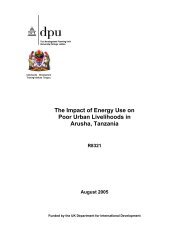EPA Review Annex Documents - DFID
EPA Review Annex Documents - DFID
EPA Review Annex Documents - DFID
Create successful ePaper yourself
Turn your PDF publications into a flip-book with our unique Google optimized e-Paper software.
access to the EU. The Caribbean countries all agreed to eliminate tariffs on the same<br />
common list of imports from the EU and included a regional preference clause in their <strong>EPA</strong><br />
extending the same tariff concessions to each other as to the EU (the Regional preference<br />
clause all applies to services and investment).<br />
The initiative of CARICOM Single Market and Economy (CSME) was launched in January<br />
2006 and fully implemented by the end of 2008. It calls for free movement of capital, goods,<br />
services, skills/labour and the establishment of the Caribbean Court of Justice. CSME has<br />
common external tariff and rules of origin. All goods entering the CARICOM which meet the<br />
CARICOM rules of origin are traded duty free throughout the region. However, there are still<br />
some specific non-tariff barriers in various member states. CSME has tried to establish its<br />
own regional harmonisation of standards – Caribbean Regional Organization on Standards<br />
and Quality which is responsible to set up regional standards that all member states must<br />
adhere to in the manufactures and trade of goods. It also establishes regional accreditation<br />
for education in medical and other health professions, free movement of skilled workers, free<br />
trade in services among member countries to facilitate trade and investment in the services<br />
sectors.<br />
The CSME is designed to represent a single economic space where people, goods, services<br />
and capital can move freely. Many of required changes have been made by participating<br />
countries/territories on a gradual basis, in keeping with national programs for the removal of<br />
restrictions on the right of establishment, the provision of services and movement of capital.<br />
The strengthening of CARICOM’s participation in the global trading arena has been done<br />
through a series of bilateral trade agreements with Venezuela, Colombia, Dominican<br />
Republic, Cuba and Costa Rica. Given each individual member state represent an<br />
insignificant share of the world trade, CSME is an important platform for the region’s trade<br />
and economic linkages with the rest of the world. It gives small states the benefits of greater<br />
critical mass, pooled resources, achieving greater economies of scale. The establishment of<br />
harmonised rules and the creation of regional mechanisms and institutions as common base<br />
enable the region to simplify its approach to the negotiation of relevant issues with other<br />
regions and the rest of the world.<br />
As mentioned previously, <strong>EPA</strong> countries in the Caribbean region have different economic<br />
characteristics compared to the Africa region. Regional integration was well under way and<br />
regional integration initiatives were better implemented. With or without the <strong>EPA</strong>, regional<br />
integration in the Caribbean will continue. With the <strong>EPA</strong> in particular, with extra help and<br />
technical assistance in the areas of standards, regulations, SPS, services, and enhances<br />
and accelerates regional integration.<br />
Pacific Regional Economic Integration Programme<br />
The unique feature of Pacific countries compared with other ACP countries in the <strong>EPA</strong><br />
negotiations is that they are far away from Europe and have little trade with the EU. For<br />
example, Fiji total net import from the EU accounted for about 2% of its total imports. Given<br />
such small bilateral trade between the pacific countries and the EU, it is not surprising that<br />
there is little appetite for negotiating trade in goods with the EU apart from Fiji’s export of<br />
sugar under the sugar protocol with the EU. With regards to canned tuna, which applies to<br />
Papua New Guinea as well, it is protected and has better market access to ACP countries<br />
compared with others by the TRQ in the EU. However, in both cases, the preferential<br />
margins (preferential prices) have been reduced. Granting preferential entry to goods from<br />
the EU would trigger demands for similar preferences from Australia, New Zealand under<br />
PACER and to the USA under the Compact Agreements.<br />
Pacific countries are interested in exporting labour services especially requesting quotas for<br />
the temporary entry of workers in the hospitality, health and construction industry and<br />
223
















